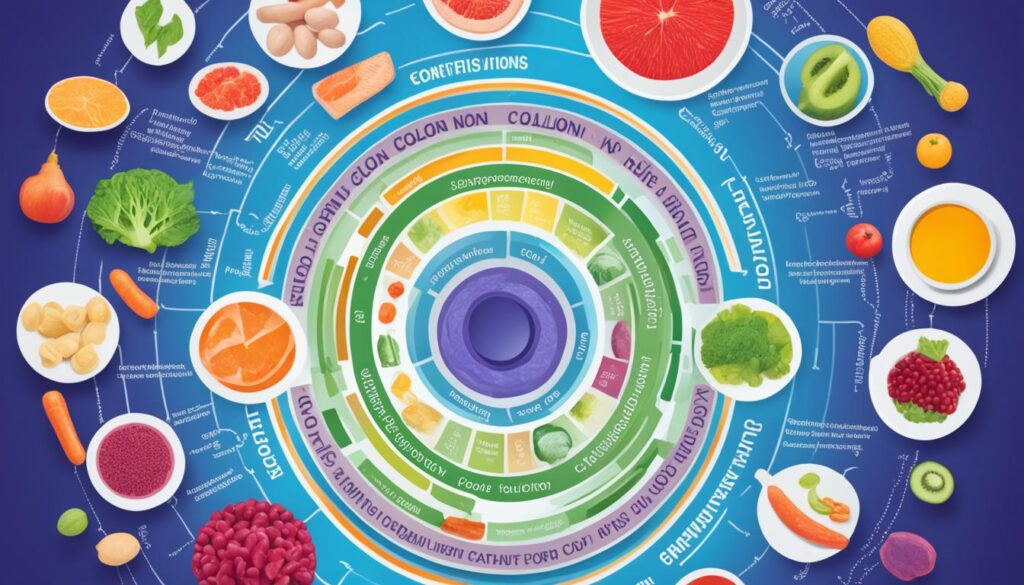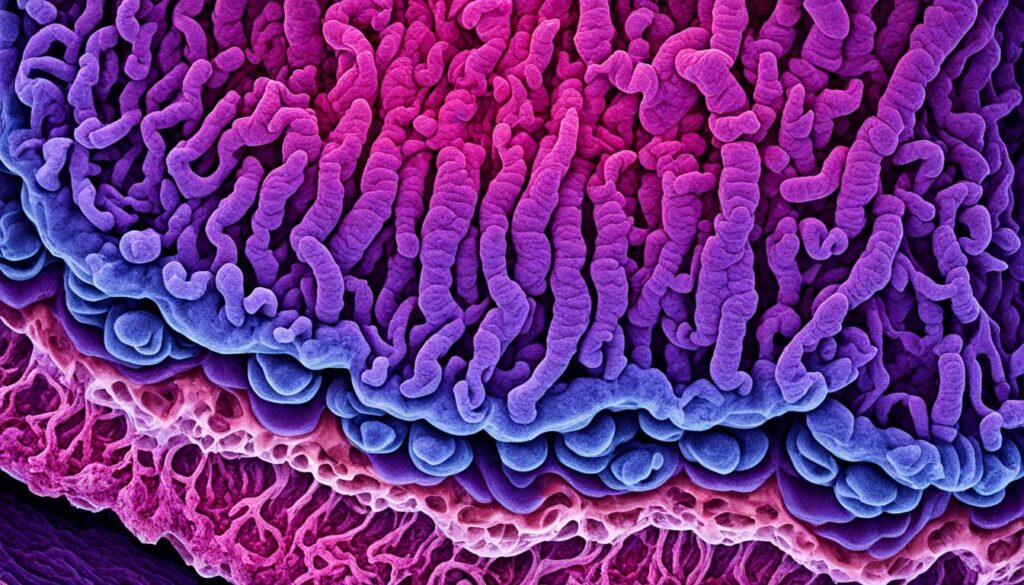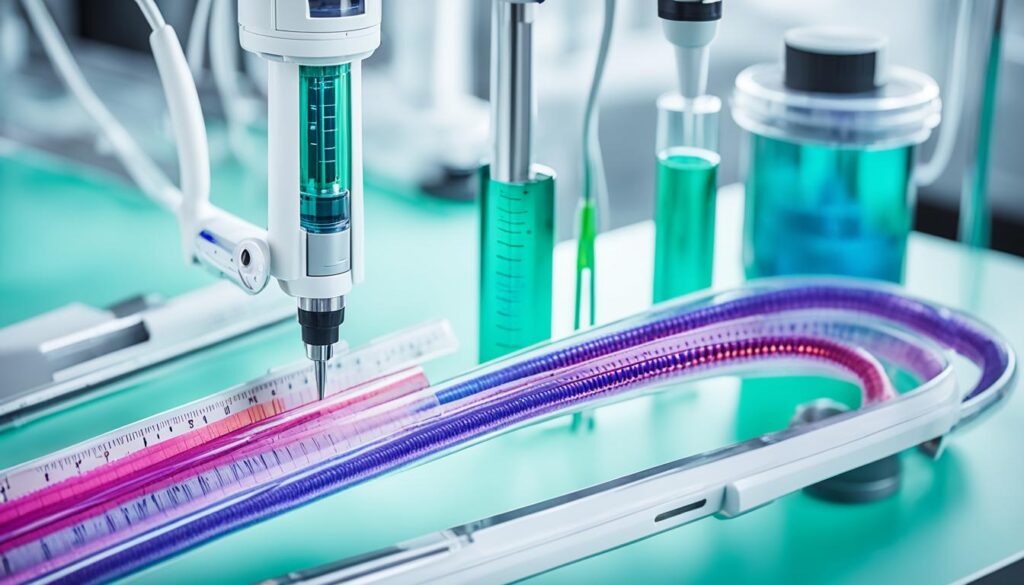Welcome to our informative guide on colonic polyps. In this article, we will explore the risks associated with colonic polyps and how you can prevent them. Colonic polyps are small clumps of cells that can develop on the lining of your colon. While most polyps are harmless, some can potentially lead to colon cancer. Understanding the risks and taking preventive measures is crucial for your long-term health.
Table of Contents
ToggleSo, what are the risk factors for colonic polyps? Age plays a significant role, especially for individuals who are 50 years or older. Other risk factors include being overweight, smoking, and having a personal or family history of colonic polyps or colon cancer. But don’t worry, there are steps you can take to reduce your risk.
Prevention is key when it comes to colonic polyps. Regular screenings are essential for early detection and removal of polyps, which is the best precautionary measure against colon cancer. By identifying and removing polyps early on, you can prevent the development of more serious complications. Consider scheduling a screening test with your healthcare provider if you haven’t done so already.
In the following sections of this article, we will delve deeper into the symptoms, causes, complications, diagnosis, and treatment options for colon polyps. We will also provide valuable insights on how you can prevent the formation of these polyps. Stay informed and take proactive steps towards maintaining your colon health.
Symptoms of Colon Polyps
Most people with colon polyps do not experience any symptoms. However, some individuals may experience a change in bowel habits, such as constipation or diarrhea, for more than a week. Other possible symptoms include a change in stool color, iron deficiency anemia, abdominal pain, and rectal bleeding. It’s important to consult a healthcare provider if you experience any of these symptoms.
Common Symptoms of Colon Polyps:
- Change in bowel habits (constipation or diarrhea lasting over a week)
- Change in stool color
- Iron deficiency anemia
- Abdominal pain
- Rectal bleeding
If you notice any of these symptoms, it’s important not to ignore them. While some symptoms may be caused by other conditions, it’s crucial to get a proper diagnosis from a healthcare professional. Early detection and treatment of colon polyps can help prevent the development of colon cancer.
| Symptoms of Colon Polyps | Frequency |
|---|---|
| Change in bowel habits | Common |
| Change in stool color | Less common |
| Iron deficiency anemia | Rare |
| Abdominal pain | Varies |
| Rectal bleeding | Varies |
It’s important to note that the presence of symptoms does not necessarily mean the presence of colon polyps. Only a proper medical evaluation can provide an accurate diagnosis. If you experience any of these symptoms, don’t hesitate to reach out to a healthcare professional for guidance and appropriate testing.
Causes and Risk Factors of Colon Polyps
The development of colon polyps is influenced by changes in certain genes that cause abnormal cell growth in the colon and rectum. These polyps can vary in size and shape, ranging from small, raised bumps to larger, flat lesions. While most colon polyps are benign, some can progress to become cancerous over time.
Several risk factors contribute to the development of colon polyps. Understanding these risk factors can help individuals take preventive measures and undergo appropriate screenings. The following are common causes and risk factors associated with colon polyps:
- Age: Colon polyps are more commonly found in individuals aged 50 or older. Regular screenings are recommended for this age group to detect and remove polyps early.
- Inflammatory Intestinal Conditions: Chronic inflammatory conditions of the intestines, such as ulcerative colitis or Crohn’s disease, increase the risk of developing colon polyps.
- Family History: Having a close relative with a history of colon polyps or colon cancer raises the risk of developing polyps.
- Smoking: Smoking cigarettes increases the likelihood of developing various types of polyps, including colon polyps.
- Excessive Alcohol Use: Heavy alcohol consumption has been linked to an increased risk of colon polyps.
- Obesity: Being overweight or obese is associated with a higher risk of developing colon polyps.
- Lack of Exercise: Leading a sedentary lifestyle and not engaging in regular physical activity can contribute to the development of colon polyps.
- Race: Black individuals have a higher risk of developing colon polyps compared to other racial groups.
- Inherited Genetic Disorders: Certain inherited genetic disorders, such as Lynch syndrome, familial adenomatous polyposis (FAP), and Peutz-Jeghers syndrome, significantly increase the risk of colon polyps.
Understanding the causes and risk factors of colon polyps allows healthcare providers to assess an individual’s susceptibility and recommend appropriate screening measures. By identifying high-risk individuals and promoting regular screenings, the early detection and removal of colon polyps can be achieved, leading to a decreased risk of developing colon cancer.

| Causes and Risk Factors | Description |
|---|---|
| Age | Most common in individuals aged 50 or older |
| Inflammatory Intestinal Conditions | Ulcerative colitis or Crohn’s disease |
| Family History | Close relative with a history of colon polyps or colon cancer |
| Smoking | Increased risk of various polyp types |
| Excessive Alcohol Use | Heavy alcohol consumption |
| Obesity | Being overweight or obese |
| Lack of Exercise | Sedentary lifestyle and physical inactivity |
| Race | Higher risk for Black individuals |
| Inherited Genetic Disorders | Lynch syndrome, FAP, and Peutz-Jeghers syndrome |
Complications of Colon Polyps
While most colon polyps are benign, it’s important to be aware of the potential complications that can arise. Developing an understanding of these complications can help you take necessary preventive measures and seek timely medical intervention for early detection and treatment.
Bleeding:
One of the complications of colon polyps is bleeding. Polyps can cause small blood vessels to rupture, leading to blood in your stool. If you notice any unusual bleeding or have black, tarry stools, it’s crucial to consult a healthcare provider for further evaluation.
Diarrhea:
Colon polyps can disrupt the normal functioning of your digestive system, potentially causing diarrhea. If you experience frequent loose stools or changes in your bowel movements, it’s important to discuss these symptoms with your doctor to determine the underlying cause.
Bowel Obstruction:
In some instances, large colon polyps can obstruct the passage of stool through the colon, leading to bowel obstruction. This can cause abdominal pain, bloating, and changes in your bowel habits. If you have persistent abdominal discomfort or difficulty passing stool, seek medical attention promptly.
Potential Progression to Colon Cancer:
While most colon polyps are harmless, some have the potential to develop into colon cancer over time. Early detection and removal of polyps can significantly reduce the risk of them progressing to cancer. Regular screenings, as recommended by your healthcare provider, are essential for early detection and prevention of colon cancer.
To give you a more comprehensive overview, here’s a table summarizing the complications of colon polyps:
| Complications | Description |
|---|---|
| Bleeding | Polyps can cause blood vessels to rupture, leading to blood in the stool. |
| Diarrhea | Polyps can disrupt normal bowel function, resulting in frequent loose stools. |
| Bowel Obstruction | Large polyps can obstruct the passage of stool through the colon, causing pain and changes in bowel habits. |
| Potential Progression to Colon Cancer | Some polyps can become cancerous over time, emphasizing the importance of early detection and removal. |
Understanding the potential complications of colon polyps underscores the significance of regular screenings and timely management. By taking proactive steps to address colon polyps, you can minimize the risk of complications and the development of colon cancer.

Diagnosis and Treatment of Colon Polyps
Diagnosing colon polyps is crucial for early detection and intervention. The gold standard for diagnosis is a colonoscopy, a procedure that allows healthcare providers to visualize and remove polyps from the colon. During a colonoscopy, a thin, flexible tube with a camera is inserted into the rectum to examine the colon.
Other diagnostic tests that can help detect colon polyps include fecal occult blood tests (FOBTs) and stool DNA tests. FOBTs check for the presence of blood in the stool, which can indicate the presence of polyps or other abnormalities. Stool DNA tests analyze the stool sample for the presence of genetic mutations associated with colon polyps and cancer.

Once colon polyps are diagnosed, treatment typically involves their removal during a colonoscopy procedure. Polyps can be completely excised during the colonoscopy, and the tissue is sent for further examination. The removal of polyps helps prevent them from becoming cancerous and reduces the risk of developing colon cancer in the future.
The frequency of follow-up colonoscopies depends on the characteristics of the polyps removed and individual risk factors. Healthcare providers may recommend follow-up colonoscopies every 3-5 years for individuals at average risk, while those with a higher risk may require more frequent screenings.
Diagnostic Tests for Colon Polyps
| Diagnostic Test | Description |
|---|---|
| Colonoscopy | A procedure that allows visualization and removal of colon polyps. |
| Fecal Occult Blood Test (FOBT) | A test that detects blood in the stool, which may indicate the presence of polyps or other abnormalities. |
| Stool DNA Test | A test that analyzes the stool sample for genetic mutations associated with colon polyps and cancer. |
Treatment for Colon Polyps
| Treatment Method | Description |
|---|---|
| Colonoscopy | Removal of colon polyps during a colonoscopy procedure. |
| Excision | Complete removal of polyps during the colonoscopy for further examination. |
| Follow-up Colonoscopies | Regular screenings based on the size, number, and characteristics of the polyps. |
Preventing Colon Polyps
Lifestyle changes can help reduce the risk of developing colon polyps. By adopting healthy habits and making conscious choices, you can take proactive steps towards preventing this condition and maintaining a healthy colon. Here are some key strategies and recommendations:
Eat a Healthy Diet
Focus on incorporating a variety of fruits, vegetables, and whole grains into your daily meals. These fiber-rich foods can promote healthy digestion and help prevent the formation of colon polyps. Additionally, aim to reduce your intake of processed foods, red meat, and unhealthy fats to further support colon health.
Limit Alcohol Consumption and Quit Smoking
Excessive alcohol consumption has been linked to an increased risk of colon polyps. Limit your alcohol intake or avoid it altogether. Smoking is another major risk factor for colon polyps and other serious health issues. Quitting smoking not only reduces your risk of developing colon polyps but also improves overall health and well-being.
Maintain a Healthy Weight
Being overweight or obese increases the risk of various health problems, including colon polyps. Incorporate regular physical activity into your routine and strive to maintain a healthy weight. Aim for at least 30 minutes of moderate-intensity exercise most days of the week.
Increase Calcium and Vitamin D Intake
Studies suggest that adequate calcium intake and vitamin D supplementation may have protective effects against colon polyps and colorectal cancer. Include dairy products, fortified foods, and leafy green vegetables in your diet to boost calcium levels. Spend some time outdoors to naturally absorb vitamin D from sunlight or consult your healthcare provider for appropriate supplementation.
Regular Screening and Follow-ups
Regular screenings and follow-ups are vital for the early detection and removal of colon polyps. Consult with your healthcare provider to determine the appropriate screening schedule based on your individual risk factors. Screening methods such as colonoscopy can help detect and remove polyps before they have the chance to develop into cancer.
By implementing these preventive measures and prioritizing your colon health, you can significantly reduce the risk of developing colon polyps and improve your overall well-being.

Conclusion
Understanding the risks and prevention strategies for colon polyps is crucial for maintaining good health. Regular screenings, healthy lifestyle choices, and early detection through diagnostic tests such as colonoscopy can help prevent the development of colon polyps and reduce the risk of colon cancer.
By scheduling regular screenings with a healthcare provider, you can ensure timely detection and removal of any polyps, preventing them from becoming cancerous. Additionally, adopting a healthy lifestyle that includes a balanced diet, regular exercise, and avoiding harmful habits like smoking and excessive alcohol consumption can further reduce your risk.
Remember that prevention is the key to combating colon polyps. By taking proactive steps and seeking guidance from a medical professional, you can effectively manage your risk and protect your long-term health. Don’t hesitate to consult with a healthcare provider for personalized recommendations and guidance regarding colon polyp prevention and management.
FAQ
What are colon polyps?
Colon polyps are small clumps of cells that develop on the lining of the colon.
Can colon polyps turn into cancer?
While most colon polyps are harmless, some can develop into colon cancer over time if left untreated.
What are the risk factors for colon polyps?
Risk factors for colon polyps include age (50 or older), being overweight, smoking, and having a personal or family history of colon polyps or colon cancer.
What are the symptoms of colon polyps?
Most people with colon polyps do not experience any symptoms. However, some individuals may experience a change in bowel habits, such as constipation or diarrhea, for more than a week. Other possible symptoms include a change in stool color, iron deficiency anemia, abdominal pain, and rectal bleeding.
What causes colon polyps?
The development of colon polyps is influenced by changes in certain genes that cause abnormal cell growth in the colon and rectum. Other risk factors include inflammatory intestinal conditions, family history of colon polyps or colon cancer, smoking, excessive alcohol use, obesity, lack of exercise, and race (Black Americans have a higher risk).
What are the complications of colon polyps?
Complications of colon polyps include bleeding, diarrhea, bowel obstruction, and the potential progression to colon cancer if left untreated.
How are colon polyps diagnosed and treated?
The gold standard for diagnosing colon polyps is a colonoscopy, during which the polyps can be visualized and removed. Other diagnostic tests include fecal occult blood tests (FOBTs) and stool DNA tests. The treatment for colon polyps involves the removal of the polyps during a colonoscopy procedure.
How can colon polyps be prevented?
Adopting healthy habits such as eating a diet rich in fruits, vegetables, and whole grains, reducing fat intake, limiting alcohol consumption, quitting smoking, engaging in regular physical activity, maintaining a healthy weight, and following recommended screening guidelines can help reduce the risk of developing colon polyps.


